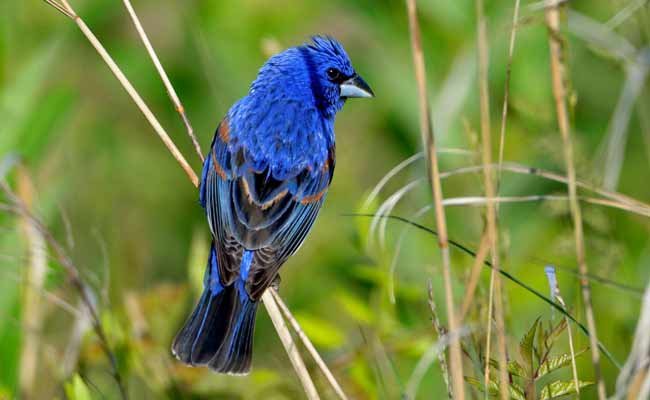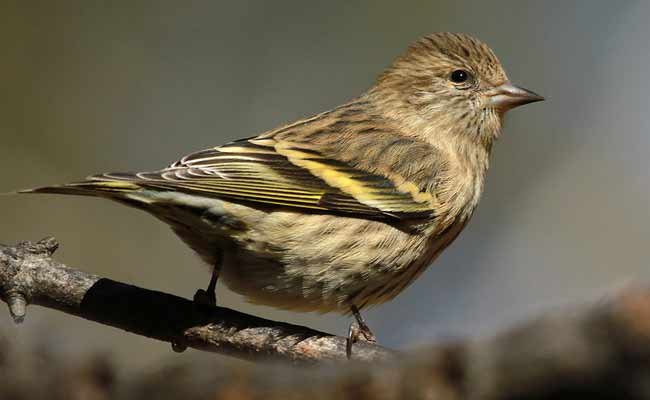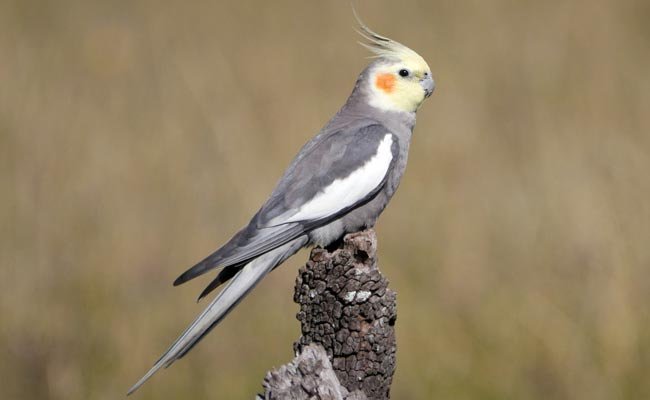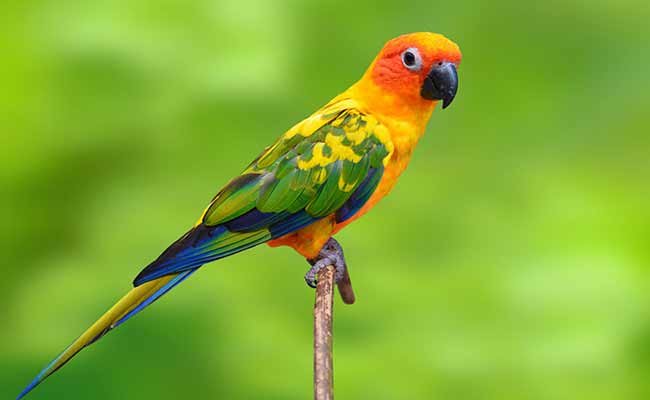
Sun Conure Care, Behavior, Diet, And Personality
March 1, 2021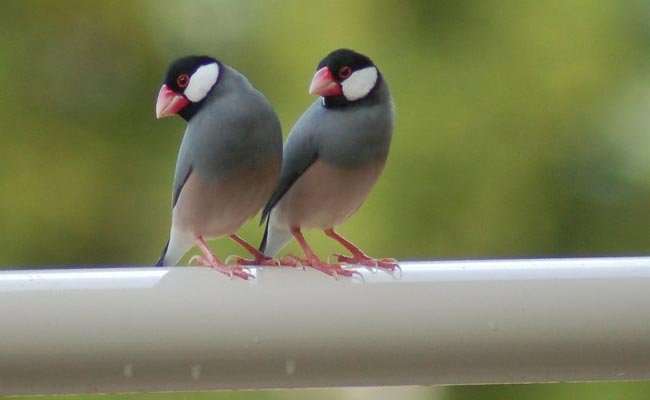
Java Finch Breeding, Care, Habitat, Price, And Personality
March 3, 2021Jenday Conure Care, Habitat, Food, Price, And Personality. Hey friends, how are you all? Today we are going to talk about Jenday Conure Food, Habitat, care, And Behavior. Like the sun conures, this beautiful bird also from the conure parrots family. They are brilliant, energetic, Colorful, and loving little parrots, making them one of the most popular pets for many years. These beautiful birds are suitable for families with children. So without wasting time, let’s get started with today’s topic.
Jenday Conure Care, Habitat, Food, Price, And Personality.
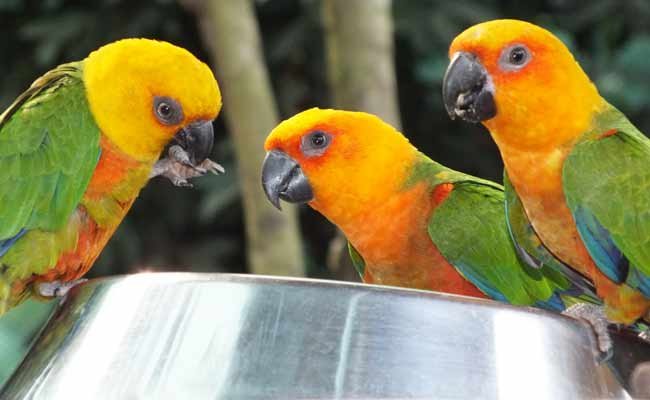
General Information.
Common Names: Yellow headed Conure, Jendaya conures, Jandaya parakeet, flaming parakeet
Scientific Name: Aratinga jandaya
Size: 12 inches in length
Weight: 4 To 5 ounces
Wingspan: 10 Inches
Lifespan: 25 to 30 years
Species: jandaya
Origin: Brazil
Behavior.
The Jenday Conure behavior is very friendly and social. In the wild, they live in flocks of 30 to 40 birds. They generally travel in flocks, especially during the food search. Jenday conure personality is wonderful and charming. These beautiful birds are very cuddly and love to be petted. They are playful, affectionate and love to ride on their handler’s shoulder. This beautiful bird needs the attention of its owners and wants to spend lots of time with its owners. Therefore, they may not be the best choice for those who do not have enough time to spend with them. Jenday conures are very intelligent, like the other members of the parrot family. They can learn simple tricks, mimic sounds, which makes them good companion birds.
Habitat.
The Jenday conure Habitat in the palm groves, woodlands, and dense growth of northeastern Brazil. In the Brazilian indigenous language, their name is Old Tupi which means Small parrot. They are social birds and live in flocks. These beautiful birds are protected species and prohibited to capture and trade.
Diet.
In the wild, Jenday conure food is fruits, vegetables, nuts, and seeds. You can give them a balanced diet like a pelleted diet, supplements, nuts, seeds, fresh fruit, and vegetables in captivity. Because of that, pet birds have a good chance of getting nutritional diets. You can offer them lots of high-quality pellet food with small amounts of fresh fruits and vegetables. As a treat, you can give them nuts once a week.
Jenday Conure Care.
These beautiful birds are deeply attached to their owners and family members. They need your attention, so it’s better to spend lots of time with them; that way, your pet bird stays happy and calm. If you don’t spend time with them, they become bored and get stressed. This beautiful small bird can live in a cockatiel cage, but it’s good to give them more space. Jenday Conure cage size must be 3 feet long and 2 feet wide or even bigger. A big cage gives them lots of space to flap their wings and easily move around in the cage. Please give them a properly balanced diet, wash their food dishes and bowls, and cage regularly to prevent any parasitic infections.
Health Problems.
This beautiful bird is susceptible to a few diseases. Jenday Conure diseases are Proventricular dilatation, Psittacine beak, and feather, Psittacosis, Beak malocclusion, Aspergillosis. If you find any sickness signs or see your pet bird plucking its feathers, then you must visit a veterinarian as soon as possible.
Signs Of Active Pet Birds.
- Active, playful, and friendly.
- Eats and drinks well
- Dry nostrils
- Bright And Dry eyes
- Dry and clean vent
- Well-groomed and Smooth feathers
Signs of Sickness.
- lethargy
- loss of appetite
- difficulty breathing
- feather-loss or plucking
- Constantly Sitting on the cage floor
- Eye and nasal discharge
- Red and swollen eyes
Nesting Habits And Breeding.
Jenday conure breeding season stays throughout the year. That means they can breed any time in the year except during the coldest and warmest months. They make their nest in the tree hollows. After the completion of the nest, the female jenday conure lays 3 To 5 White eggs. Incubation is done by the females only, but during incubation, the male feeds the female. The female incubates the eggs for 23 to 24 days. After hatching, baby jenday conures are feed by both parents for the next 7 to 8 weeks. After fledging, they are fully independent in the next 2 to 3 weeks.
Clutch size: 3 To 5 Eggs
Incubation period: 23 To 24 Days
Nesting period: 7 To 8 Weeks
Breeding age: 2 Years for both male and female
Breeding season: throughout the year
Jenday Conure Colors And Markings.
These beautiful birds are one of the most colorful parrots and have multi-colored plumage on their body. Their body color is red-orange, and their back and wings are green. They are also known as yellow-headed conures because of their yellow head with orange patches on the face. Jenday’s tail And wings have blue feathers, the beak is black, and the feet and legs are grey. Jenday conure is a monomorphic species which means both males and females are the same in coloration. There is only one way to find out the difference between males and females, and that is DNA testing. There is only one difference, but if you are lucky, then you can find out this difference. The males have dark brown eyes with a white eye-ring, and the females have light brown eyes with a greyish eye-ring.
Sounds.
These beautiful birds can mimic human speech like larger parrots. They can learn a few words but most jendays don’t speak very well. Therefore we can say that they are not the best talking parrots, but they are very entertaining. Jenday conure parrots can learn everyday household noises such as telephones ring bell and doorbell. Jenday conures sounds are loud, especially during flight. They can be noisy when they get bored or feeling lonely.
Jenday Conure Vs Sun Conure Difference.
There is not much Difference Between Jenday Conures and Sun Conures. They are very similar in appearance and size, especially when they are babies. But when they become adults, there is a big difference between them which you can find out by just looking at them. The easiest way to tell is that Jenday has a green back and wings, while on the other hand sun’s back and wings are mostly yellow.
How Much Do Jenday Conures Cost?
Jenday conure price depends on many factors like the time of sale, bird age, DNA testing, is it an adult or a baby. When you buy a jenday conure pet bird, make sure that the bird is active and healthy. On average, their price can be 400$ to 600$ in the market.
Facts.
- They can be noisy, but they are very friendly and sociable.
- They are one of the monomorphic species.
- They can mimic household sounds like doorbells and telephone rings.
- Jenday conure lifespan can be up to 25 to 30 years in captivity.
- Jenday conure talking ability is not good like African grey or other best talking parrots.
- Jenday conure scream when they feel lonely or get bored.
Final Words.
So, friends, we hope that you enjoy our article Jenday Conure Care, Habitat, Food, Price, And Personality. Please give us your feedback in the comments.

